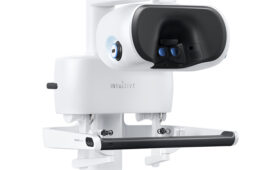
Medical devices for use at home are among the top health tech hazards. [Photo by tata_cos via Stock.Adobe.com]
ECRI said it developed its list based on reports of medical-device-related events (including adverse events and near misses), lab testing of devices, observations and assessments of hospital operations, literature reviews and conversations with clinicians, clinical engineers, device suppliers and other key stakeholders.
“The topics chosen are not necessarily the most frequently reported problems or the ones associated with the most severe consequences — although we do consider such information in our analysis,” ECRI explains in its report. “Rather, the list reflects our judgment about which risks should be given attention now to help care providers, as well as device manufacturers, prioritize their patient safety efforts.”
In addition to identifying the top health tech hazards of 2024, ECRI offered advice to medtech developers to improve product safety for six of the hazards. For the other four hazards, the nonprofit offered recommendations for relevant healthcare providers and policymakers.
1. Medical devices may pose usability challenges for home users, risking misuse and patient harm.
Device recommendation: “ECRI challenges manufacturers of devices that may be used in the home to consider the needs of users in this setting. Device operation should be intuitive, instructions should be written for a lay audience, and user support should be available.”
2. Inadequate or onerous device cleaning instructions endanger patients.
Device recommendation: “ECRI challenges manufacturers of reusable medical devices and healthcare items to provide practical, validated reprocessing instructions for their products. These instructions should adhere to relevant FDA guidance and should involve the use of common healthcare cleaning products.”
3. Sterile drug compounding without the use of technological safeguards increases the risk of medication errors.
ECRI suggested these preventative measures: “Both ECRI and the Institute for Safe Medication Practices (ISMP) recommend that pharmacy departments implement technological safeguards — like workflow management systems — to minimize opportunities for human error in the sterile compounding process. These systems offer a range of capabilities (e.g., bar coding, gravimetric analysis) both to help prevent errors during the manual steps in the process and to help catch errors before they reach the patient.”
4. Overlooked environmental impacts of patient care endanger public health.
Device recommendation: “ECRI challenges medical device manufacturers to design products with sustainability in mind — for example, by reducing the use of materials that contribute to environmental harm, by making reusable products easier to clean using minimally damaging processes, and by minimizing waste material (e.g., packaging) included with each product.”
5. Insufficient governance of AI used in medical technologies risks inappropriate care decisions.
On the topic of artificial intelligence in healthcare tech, ECRI said healthcare organizations “need to establish a robust AI governance program that addresses all phases of technology adoption and use. When considering a system that incorporates AI functionality, this will involve assessing the risks and determining the potential impact on patient care. During procurement, it will involve testing whether the system will work as expected with your patient population and care practices. After implementation, it will involve monitoring performance, capturing problems associated with its use (e.g., decisions that providers find questionable), and maintaining the system over time.”
6. Ransomware targeting the healthcare sector remains a critical threat.
While medical device developers and regulators like the FDA are focusing more on cybersecurity than ever before, ECRI said healthcare delivery organizations (HDOs) need more support from the government.
“HDOs need broad support to fend off and, when necessary, respond to ransomware attacks. Areas for policymakers to consider include incentives for implementing strong security programs, as well as HDOs’ wherewithal to do so (in terms of funding and staffing); law enforcement tools for disrupting criminal networks; and the unintended consequences of existing penalty structures for being victimized by a ransomware attack.”
7. Increased burn risk with single-foil electrosurgical return electrodes.
Single-foil conductive return electrodes lack safety features to prevent electrosurgery-related burns, ECRI said. In some cases where patients were burned, healthcare providers were not aware of the risk or safer alternatives such as dual-foil conductive return electrodes and capacitive return electrodes.
Device recommendation: “ECRI challenges return electrode manufacturers to cease the manufacture and sale of single-foil conductive return electrodes, particularly for adult patients.”
8. Infusion pump damage remains a medication safety concern.
Device recommendation: “ECRI challenges manufacturers to advance the technology by designing models that, for example, have fewer damage-prone components, can more reliably prevent gravity flow, and are made from materials that can withstand cleaning with a greater variety of chemicals. Further, we encourage manufacturers to simplify cleaning steps and develop means to help users adhere to validated cleaning and disinfection methods.”
9. Poor quality control of implantable orthopedic products can lead to surgical delays and patient harm.
ECRI previously warned of defective single-use medical devices, and now wants to draw attention specifically to orthopedic implants. Problems include incorrect labeling or packaging, device incompatibility and missing components, and product defects.
“ECRI challenges manufacturers of implantable orthopedic products — and all single-use medical devices — to strive for zero defects in their manufacturing and packaging processes.”
10. Third-party web analytics software can compromise patient confidentiality.
“ECRI recommends that healthcare organizations remove third-party web analytics software from patient portals, as well as from ‘find a doctor’ and medical library pages. In ECRI’s view: Patients expect a provider’s website to be a confidential safe haven for seeking medical information, treatment, and services. The collection and potential exploitation of private information could lead to patient distrust of the healthcare provider.”
More information is available from the ECRI website.
Related: These devices are the top targets of lawsuit-related advertisements




